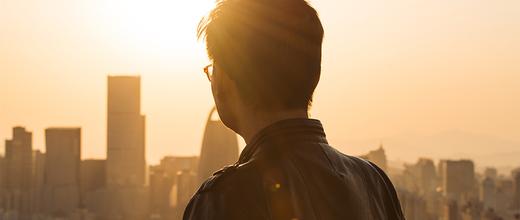The views expressed in our content reflect individual perspectives and do not represent the authoritative views of the Baha'i Faith.
Do you feel guilty when you can’t maintain optimism and joy? Sometimes, in an effort to become our best selves, we tend towards guilt after we inevitably fall short.
The world outside of us does not necessarily make avoiding such negative reactions to imperfection much easier.
We often affiliate guilt and justice with one another. In legal terms, “to be found guilty” means that justice will supposedly be served. Maybe that’s why we often treat our own selves punitively, associating feeling guilty with seeking a just resolution to something we felt or did. When that happens, though, rather than maintaining a level head and assessing for, and then addressing, the root cause of our wrongdoings we can gravitate toward self-loathing. Then, being overwhelmed by guilt or shame can become a barrier to our inner growth.
If we become so wrapped up in our own feelings about what we have done wrong a few things can happen:
- we can forget to try and alleviate any damage we may have caused others
- regret might root us in the past—in a way, guilt can take us out of commission as productive members of our society
- or guilt can hold us back by reinforcing a false, individualistic view of human nature.
Now, refusing to wallow in guilt does not imply that we should ignore our regrets. In fact, the Baha’i teachings suggest the opposite: “Bring thyself to account each day, ere thou art summoned to a reckoning …” – Baha’u’llah, The Hidden Words, p. 11. They advise us to examine our own actions and self-correct in order to grow, rather than simply continuing them and attempting to compensate by feeling guilty.
This focus on growth rather than guilt does not imply that we do not seek justice:
Justice is not limited, it is a universal quality. Its operation must be carried out in all classes, from the highest to the lowest. Justice must be sacred, and the rights of all the people must be considered. Desire for others only that which you desire for yourselves. – Abdu’l-Baha, Paris Talks, p. 49.
The Baha’i teachings advise, for our own development as individuals and for the greater well-being of our world, that we consistently reflect on our actions and thoughts, on the problems of our world, and then strive to rectify what we find to be wrong. We all need to develop this sense of internal and external justice, Abdu’l-Baha wrote:
Make ye a mighty effort till you yourselves betoken this advancement and all these confirmations, and become focal centres of God’s blessings, daysprings of the light of His unity, promoters of the gifts and graces of civilized life. Be ye in that land vanguards of the perfections of humankind; carry forward the various branches of knowledge, be active and progressive in the field of inventions and the arts. Endeavour to rectify the conduct of men, and seek to excel the whole world in moral character. – Abdu’l-Baha, Selections from the Writings of Abdu’l-Baha, p. 129.
The challenge then becomes one of balance; we have to stay conscious that we each tread a fine line between accountability and sitting in guilt. We have to be able to recognize our faults in order to heal—but we also need to be able to detach from the frustration we have with our human frailties and shortcomings. The Baha’i teachings urge us to:
Be kind to all around and serve one another; love to be just and true in all your dealings; pray always and so live your life that sorrow cannot touch you. – Abdu’l-Baha, Abdu’l-Baha in London, p. 82.
If we cannot treat ourselves with patience and mercy, how can we practice extending this same expression of love towards others?
The whole human race is submerged in the sea of the mercy of the Lord and we are all the sheep of the one divine shepherd. Whatever shortcomings exist among us must be remedied. For example those who are ignorant must be educated so that they may become wise; the sick must be treated until they recover; those who are immature must be trained in order to reach maturity; those asleep must be awakened. All this must be accomplished through love and not through hatred and hostility. – Abdu’l-Baha, The Promulgation of Universal Peace, p. 131.

















Comments
Sign in or create an account
Continue with Facebookor